Agriculture & Environment
Call for Applications: Four (4) PhD Positions – BOLDER Project
Published
7 months agoon
By
Mak Editor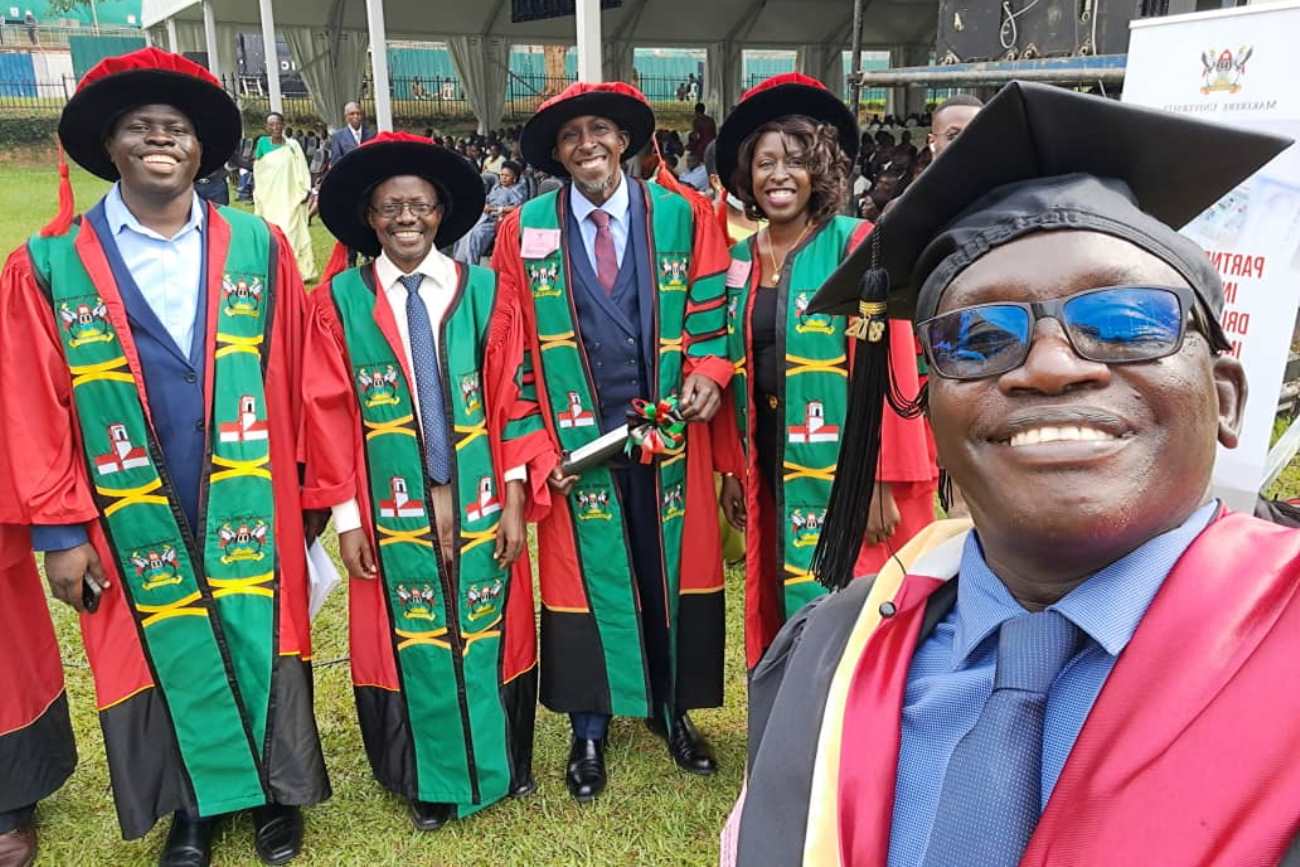
Building Opportunity for Lesser-known Diversity in Edible Resources (BOLDER) of the Crop Trust
Opportunity Crop Scholarships
Call for applications for four PhD positions
Makerere University Regional Centre for Crop Improvement (MaRCCI),
Makerere University & The Norwegian University of Life Sciences
1st December 2024
Background
One of the 17 Sustainable Development Goals is to attain zero hunger by 2030, but whether most of African countries are on track towards this ideal is questionable, While the continent is projected to be the most populous one by the year 2100, a critical mass of its population is already food-insecure, a situation that is being exacerbated by climate change and environmental degradations.
Coping with these complex issues require adopting an integrated approach of disrupting overreliance on major commodities such as rice, maize, and wheat over the opportunity crops also called neglected and underutilized species (NUS). These species are nutrient-dense, hold the ability to help diversify both the agricultural and the food system and constitute a security net that filters pest and disease-caused damages3. However, the current organizational architecture of these species suggests they cannot compete with the so-called major crops because of several limitations including: the paucity of established data (e.g., production statistics, nutritional data), the poorly organized value chains (when they exist), and the low flow of knowledge, technology and products among the value chains actors, among others.
The ‘Building Opportunities for Lesser-known Diversity in Edible Resources’ (BOLDER) project, an extended work package of the larger ‘Biodiversity for Opportunity, Livelihoods and Development’ (BOLD) initiative is designed to promote opportunity crops in West African countries (Benin and Ghana) and East African countries (Uganda and Tanzania). BOLDER is a three-phase project dedicated to improving nutritional security in West and East Africa through the increased use and value of nutritious but currently underutilized, climate-resilient and environmentally friendly crops.
BOLDER will work towards exhibiting the potential for four opportunity crops in each of the four target countries and operates through three pillars namely: i) increasing the availability of the target opportunity crops diversity; ii) improving the production, marketing, and/or consumption of these opportunity crops, and iii) enhancing the capacity of researchers, practitioners, and food system actors to improve use and value of opportunity crops. Under this third pillar, a total of eight PhDs students (four in East Africa and four in West Africa) will be trained in Plant Sciences, Food Systems and Value Chain R4D. The PhD training in East Africa will be coordinated by MaRCCI, Makerere University, in collaboration with The Norwegian University of Life Sciences (NMBU).
Objectives of this call
This call for applications is open to citizens of Uganda and Tanzania to fill four PhD positions: two in Plant Sciences and two in Food Systems.
All four PhD candidates will register at Makerere University and will be supervised by a panel of scientists from MaRCCI, Department of Agricultural Production (DAP), Department of Plant Sciences, Microbiology and Biotechnology (PMB), and Department of Agribusiness & Natural Resource Economics (DANRE), The Norwegian University of Life Sciences (NMBU), The Alliance of Bioversity International and CIAT (ABC) and the World Vegetable Center (World Veg). Decisions about supervisory arrangements will be made based on research proposals of successful applicants.
Expectations from the recruited PhD candidates
The two Plant Science PhD candidates through their research will contribute to the BOLDER project output of characterizing opportunity crops’ diversity and participatory evaluations using the TRICOT approach, while the other two students will contribute to the BOLDER Output of deepening our understanding of opportunity crops food systems and value chains and pursuing opportunities for greater contributions to livelihoods and diets.
Plant Science Applicants
The two Plant Science PhD student research projects will focus on the genetic and low-cost phenotypic characterization of farmer collection/landraces, genebank, and breeding materials for opportunity crops (stakeholder selected opportunity crops for Uganda i.e. cowpea, pumpkin, and amaranth, while for Tanzania the pre-selected crops are Bambara groundnuts and sweet potato). The aim is to generate key information on the adaptive traits of opportunity crops, their nutritional value, and their suitability for different uses, such as food, feed, and fiber. The research will further identify unique genotypes and suitable breeding strategies for improving desirable traits.
Another aspect of the PhD research will involve conducting a performance evaluation of opportunity crops traits using the citizen science approach known as triadic comparisons of technology options (tricot). This approach applies to an incomplete block design to assign randomized incomplete blocks of three technologies (out of larger number) to many farmers from different gender and socioeconomic groups for on-farm assessment in diverse agro-ecologies. Combining this approach with digital tools makes it possible to obtain insights for both local adaptation and a scale of reach compared to earlier participatory plant breeding/variety selection approaches. This approach has shown promising results recently and it is on the scale in East Africa. The planned PhD research and training will be critical in building local capacity for demand-led breeding and evaluation of opportunity crops using data science at a low cost in East Africa. The goal is to improve the identification and selection of opportunity crops varieties with desirable traits, ultimately leading to the mainstreaming of NUS in sustainable food systems in Africa.
In summary, the PhD projects will combine genomics research and on-farm tricot experiments and provide evidence on how this approach can lead to a demand-driven breeding of different NUS, accelerate trait discovery for climate adaptation, strengthen seed systems, increase use of NUS, and create links to the value chain.
We invite PhD research concept note focusing on one of the pre-selected crops in one of the countries.
Food Systems Applicants
The two PhD research projects in Food Systems will focus on two main areas, also in relation to the selected species for the two countries. The first area will be value chains of the focal crops. Specifically, this aspect of the research will characterize the current state of value chains and explore bottlenecks, inefficiencies, and opportunities, including related to production, processing, distribution, marketing and consumption.
The research will also analyze the demand for opportunity crop products, the preferences and behaviors of consumers (including consumer preference trials using the tricot approach), and the most effective interventions for promoting opportunity crops in food systems.
The second area of focus in Food Systems will be the nexus between traditional knowledge on the cultivation and consumption of NUS (local food culture) and the broader political and economic factors affecting the development and promotion of opportunity crops in inclusive and equitable food systems. This project will examine the interconnection between the cultural practices of local communities regarding the cultivation and consumption of opportunity crops and the wider economic and political systems that shape the food systems in which these communities operate. On the one hand, local food cultures have evolved over generations and reflect the specific ecological, social, and cultural contexts in which they are situated. This traditional knowledge often includes cultivation practices, processing methods, and culinary traditions associated with opportunity crops. Such traditional knowledge is important for
understanding opportunity crops nutritional, cultural, and economic significance and how they can be integrated into sustainable food systems. On the other hand, development and promotion of opportunity crops in inclusive and equitable food systems is shaped by broader political and economic factors, including government policies, global trade agreements, corporate influence, and consumer preferences. These factors can create barriers to the promotion and development of opportunity crops, which can impact the livelihoods of smallholder farmers and the availability of diverse and nutritious foods for local communities. By understanding these factors, the research will aim to identify opportunities to promote the development and promotion of opportunity crops in inclusive and equitable food systems in Africa.
We invite PhD research concept note that addresses one of the two food system areas outlined above. The proposal can focus on or several of the pre-selected crops in one or both of the countries.
Scholarship: financial support and duration
The scholarship includes subsistence allowances, contribution to research costs,
insurance cost, contribution to conference attendance cost and cost related to the
participation in BOLDER-organized training relevant to the various PhD topics. The PhD
candidate will also benefit from a three-month mobility (once) to conduct parts of his/her
research at NBMU.
a) The PhD duration is 48 months.
b) PhD students will receive a monthly stipend of $600 for Ugandans and $700 for
Tanzania Nationals (when in Uganda) and 1,500 Euros when in Norway. This amount
includes settling allowance.
c) Additional benefits are available on a case-by-case basis.
Eligibility
Applicants should meet the following criteria at the time of their scholarship application:
a) be a citizen of Uganda or Tanzania.
b) be proficient in written and spoken English.
c) not be currently enrolled or have a running scholarship in another PhD program.
For Plant Science Students:
d) hold a MSc degree in agronomy, plant breeding, genetics, biotechnology, crop protection or another relevant discipline.
e) demonstrate knowledge of or prior experience with tricot methodology and genomics research.
For Food Systems Students:
f) hold a MSc degree in Agricultural and Applied economics, Agribusiness, Agricultural economics, or another relevant discipline.
g) demonstrate experience of prior research on value chains, consumer behavior, or political economy of food systems.
Applicants who have working experience on the listed NUS crops will have an added
advantage.
Submission
The Scholarship application file is to be submitted as PDF attachment by the deadline to the emails indicated in section, and should include the following:
a) Cover or motivation letter.
b) Student research concept note that clearly indicates the topic to which the candidate applies (3 pages maximum).
c) National ID or Copy of Passport Bio Data page.
d) Certificate of previous degree(s) /or a Proof that the degree(s) has been completed;
e) All transcripts/academic records.
f) A support letter from home Higher Education Institution (from the MSc supervisor);
g) Two recommendation letters.
h) Curriculum Vitae.
i) Any other supporting documents (e.g., first page of publications).
Deadline
Applications should be submitted to Ms. Candia Alice on e-mail cndlc95@gmail.com and copy in Dr. Ozimati Alfred Adebo: ozimatialfred@gmail.com and Dr. Dramadri Isaac Onziga onzigaisaac@gmail.com not later than December 20th, 2024. All applications received will be acknowledged, however only shortlisted candidates will be contacted and invited for an interview.
You may like
-


Press Statement on Ranking
-
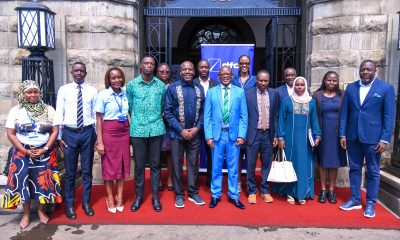

Makerere University, DFCU Bank Sign MoU to Advance Innovation, Student Leadership and Research
-
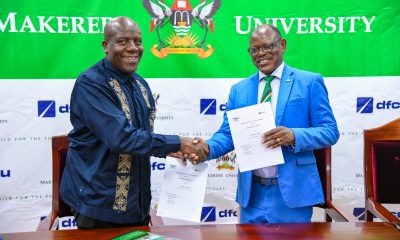

Press Release: Mak & DFCU Partner to Enhance Higher Education, Research & Student Support
-
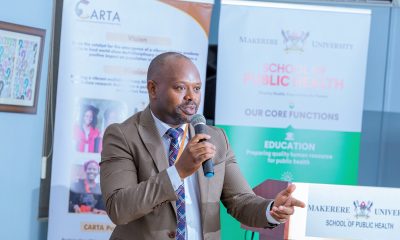

CARTA Focal Person Dr. Isunju Appointed to MakPress Editorial Board
-
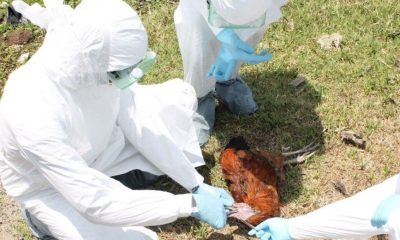

Advancing Regional Health Priorities Through the CARTA Research Hubs
-
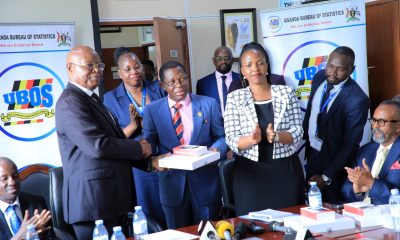

Makerere University Receives 700 Tablets from UBOS to Boost Statistical Activities
Agriculture & Environment
SophiA Project Upgrades Medical Infrastructure at Buvuma Health Centre IV, Trains Technicians for Maintenance Works
Published
2 days agoon
July 9, 2025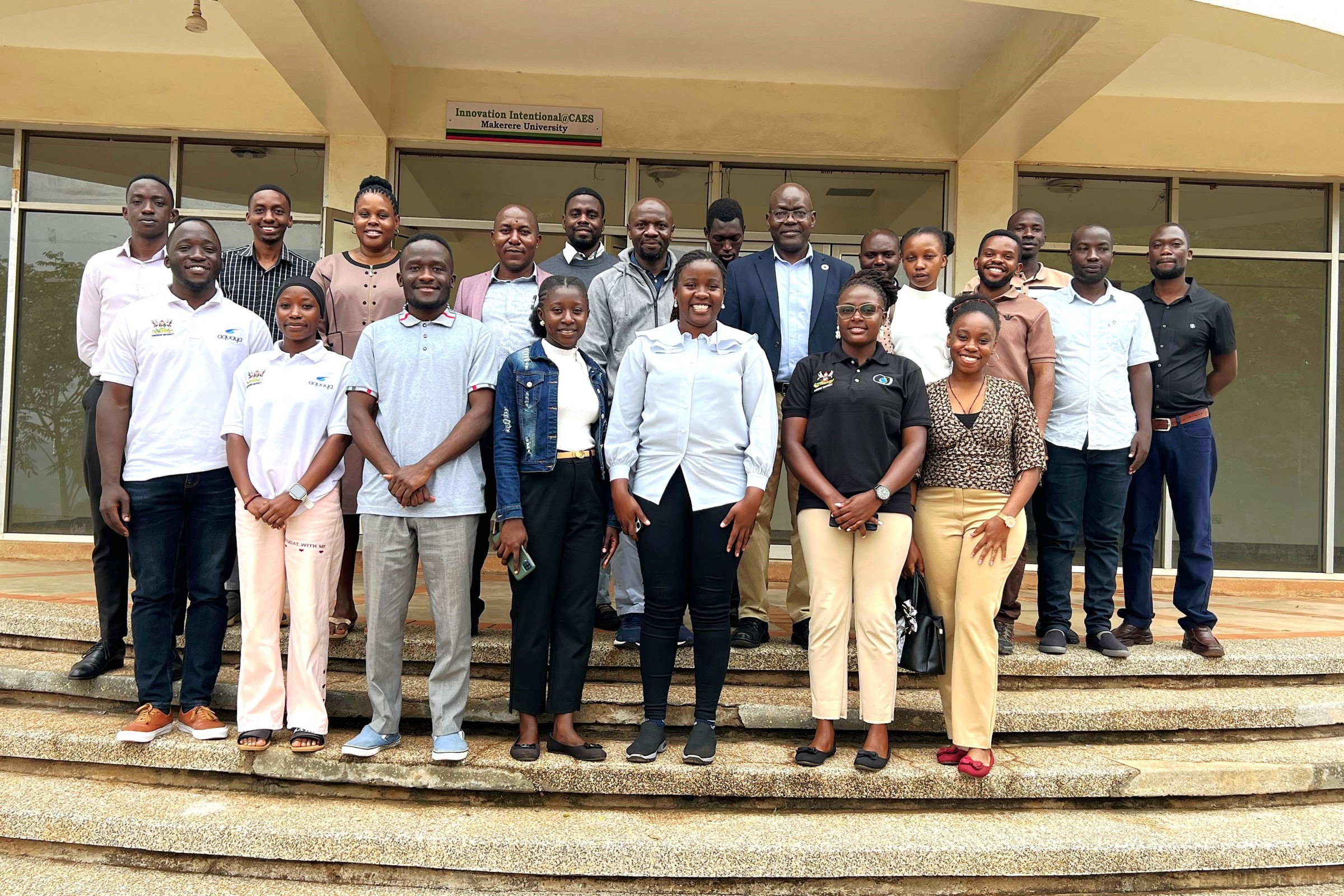
Overview of the Sustainable Off-Grid Solutions for Pharmacies and Hospitals in Africa (SophiA) Project
Despite ongoing urbanization across Africa, the majority of the population still resides in rural and remote areas, where infrastructure development remains limited. These regions face significant challenges such as lack of access to healthcare, education, clean water, and reliable electricity, contributing to higher rates of illness and poverty compared to urban centres. According to reports, Sub-Saharan Africa has approximately 120,000 public health facilities (22,000 hospitals and 98,000 health posts), of which around 26% lack any electricity access, and only 28% have reliable power supply.
Access to good healthcare is critical for sustainable development. However, many rural medical centres operate under harsh conditions – using polluted water, lacking cooling for medicines, and facing poor sanitation – largely due to unreliable electricity and water supply. Although half of the population in Sub-Saharan Africa lacks electricity, the region has abundant renewable energy potential that can be effectively harnessed through off-grid solar photovoltaic (PV) systems.
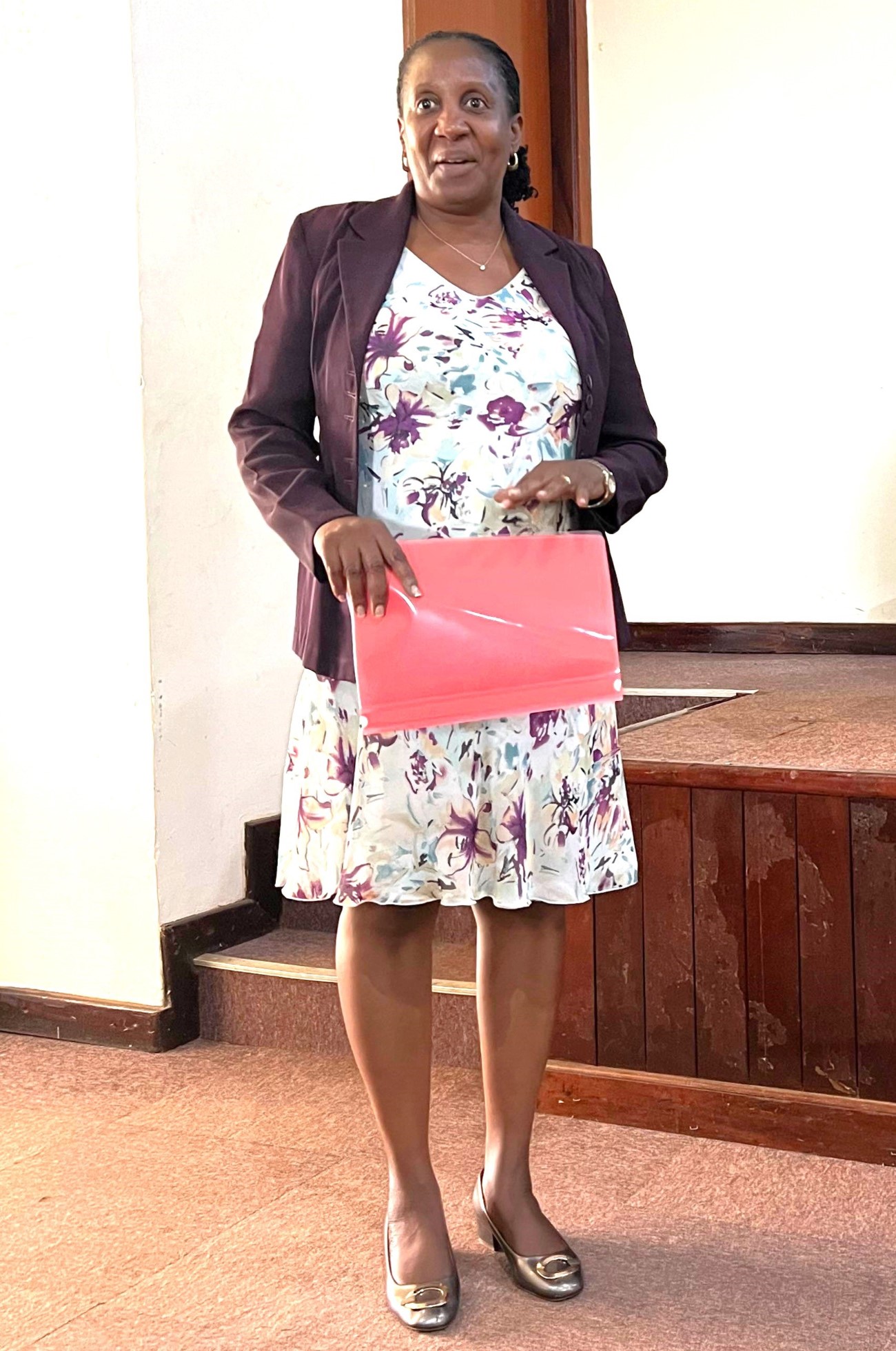
To address the above-mentioned challenges facing the African Continent, Makerere University in partnership with 13 organizations across Europe and Africa developed a project titled, “Sustainable Off-grid solutions for Pharmacies and Hospitals in Africa (SophiA)”. The five-year project that began on 1st October 2021 is funded by the European Union (Project: 101036836 – SophiA – H2020-LC-GD-2-3-2020). At Makerere University, the project is coordinated by Dr. Nicholas Kiggundu, Associate Professor in the Department of Agricultural and Biosystems Engineering, College of Agricultural and Environmental Sciences (CAES).
Piloted in Burkina Faso, Cameroon, Malawi, and Uganda, SophiA aims to provide sustainable off-grid energy solutions to rural and remote health facilities, fostering economic growth and ensuring equitable access to energy and healthcare. Using various technologies, such as photovoltaics, solar thermal, electrical and thermal storage, water treatment and natural refrigerants with low global warming potential, SophiA has developed and manufactured locally innovative, modular, affordable and efficient solar powered systems for providing:
- Safe and clean drinking water, free of bacteria and viruses, and deionised water for medical purposes;
- Hot water and steam production for thermal requirements of the hospitals;
- Cooling of medicines and food at +5°C;
- Low temperature storage of blood plasma and vaccines at -30°C;
- Ultra-low temperature storage of sensitive medication (e.g. some Covid-19 or Ebola vaccines) at -70°C.
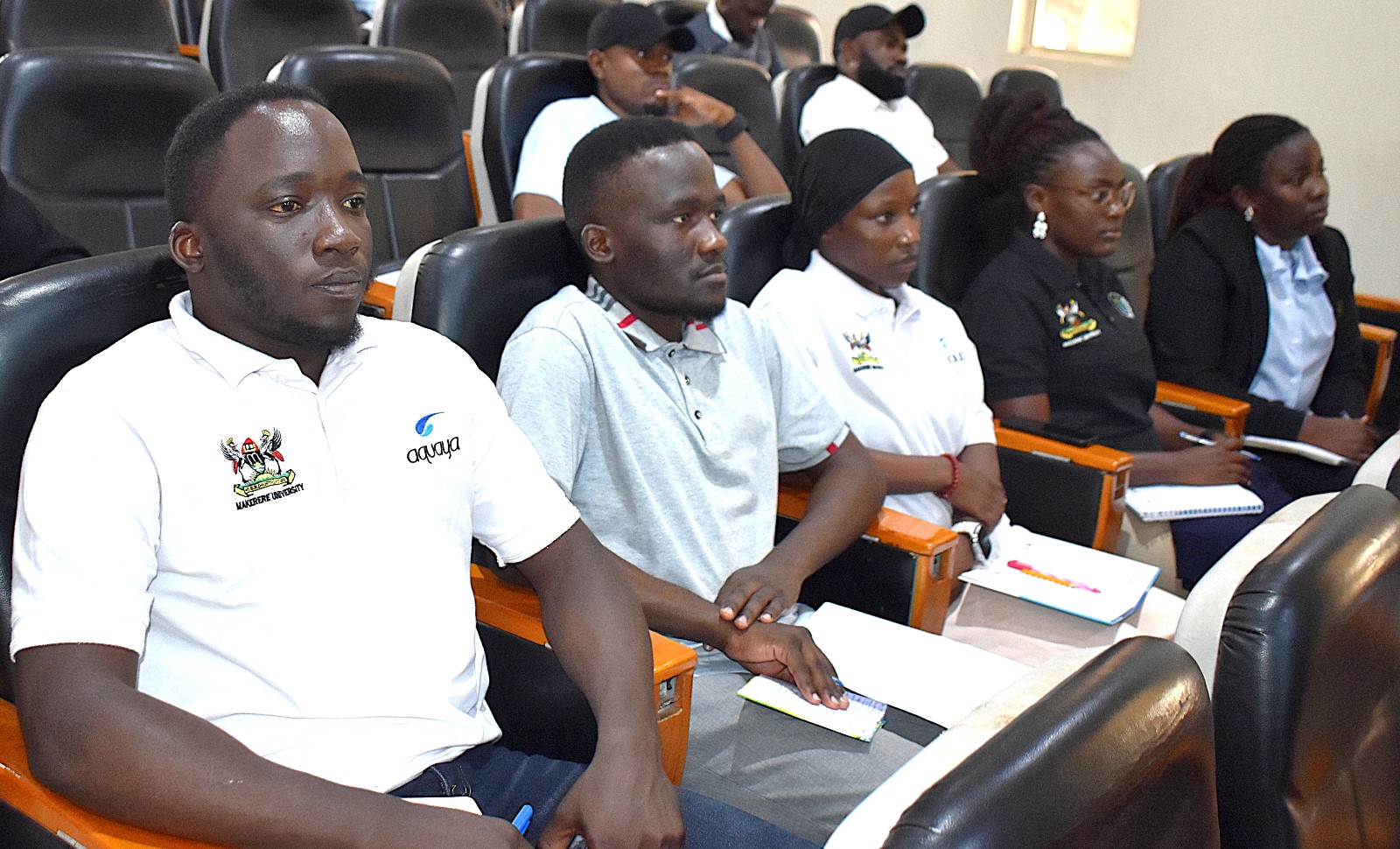
In addition, PV MedPort, a simple and 100% solar-powered solution has been developed and tested as a mobile health care station in small remote areas in 4 different geographical conditions in Africa. The SophiA system has been manufactured in Africa and will provide, for the first-time, innovative solutions based on climate-friendly natural refrigerants to cover cooling demand for three different temperature ranges (-70°C, -30°C and +5°C). The system has been tested and demonstrated at four rural hospitals in remote regions throughout the African continent covering the major geographical regions and different climatic conditions in Burkina Faso, Cameroon, Malawi and Uganda.
SophiA Project initiatives in Uganda
In Uganda, all Health Centre IV hospitals with surgical theatres have been connected to the national grid except Buvuma Health Centre IV, which serves over 120,000 people scattered across 52 islands. Recognizing this gap, the Ministry of Health selected Buvuma Health Centre IV for the SophiA project to demonstrate sustainable off-grid solutions.
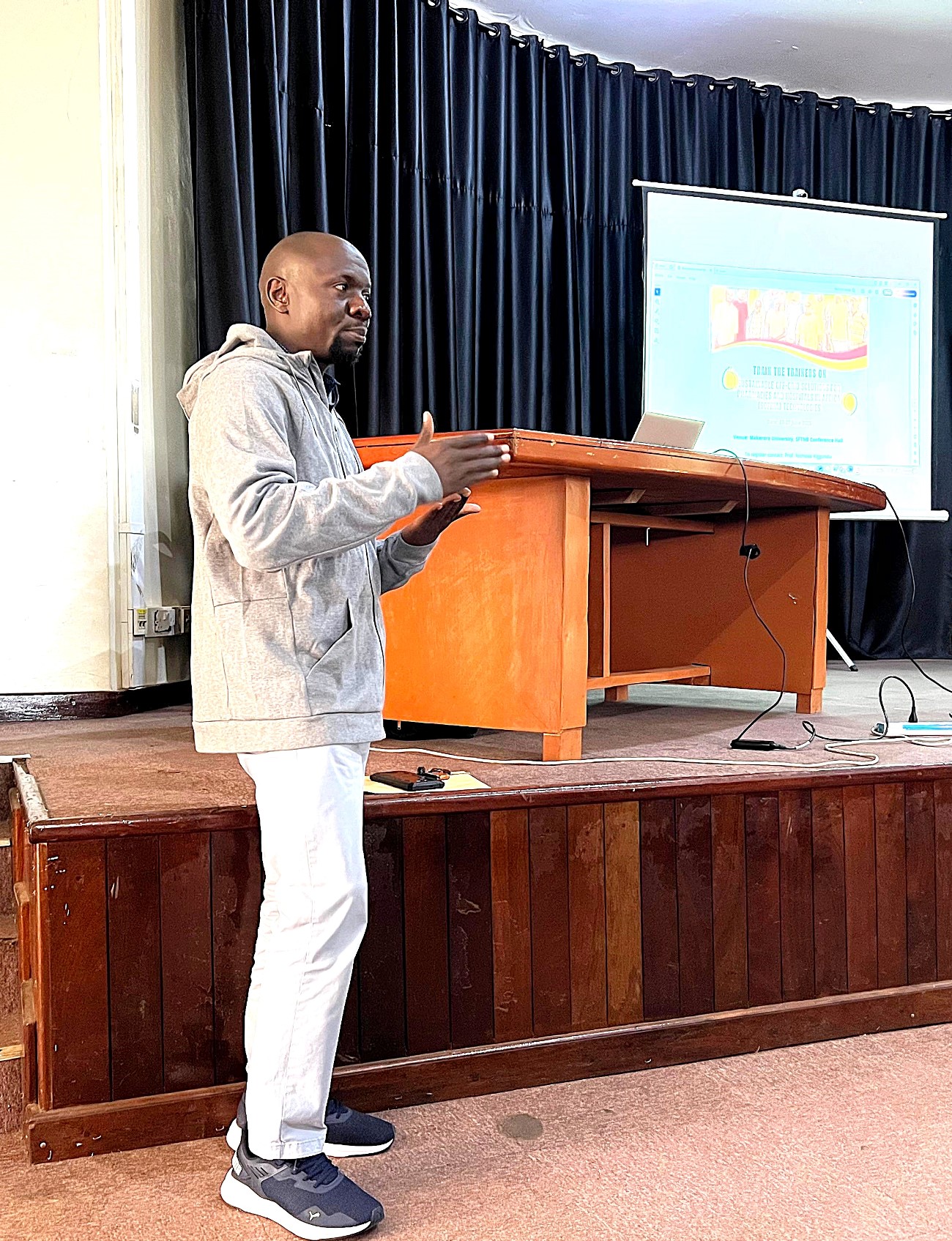
The SophiA System at Buvuma Health Centre IV provides the following services:
- Off-grid electricity supply
- Safe, clean drinking water for patients, staff, and the community
- Hot water and steam systems crucial for maternal care
- Solar-powered cooking and meal preparation
- Cooling systems for surgery and intensive care units
- Refrigeration for medicines at +5°C, blood plasma storage at -30°C, and ultra-low temperature storage (-70°C) for sensitive vaccines such as those for COVID-19 and Ebola
Training of Trainers Workshop
As the SophiA project approaches completion in September 2025, it is vital to establish a skilled pool of technicians capable of handling maintenance and minor repairs of the system components, including solar panels, water treatment units, generators, batteries, and cooking kits.
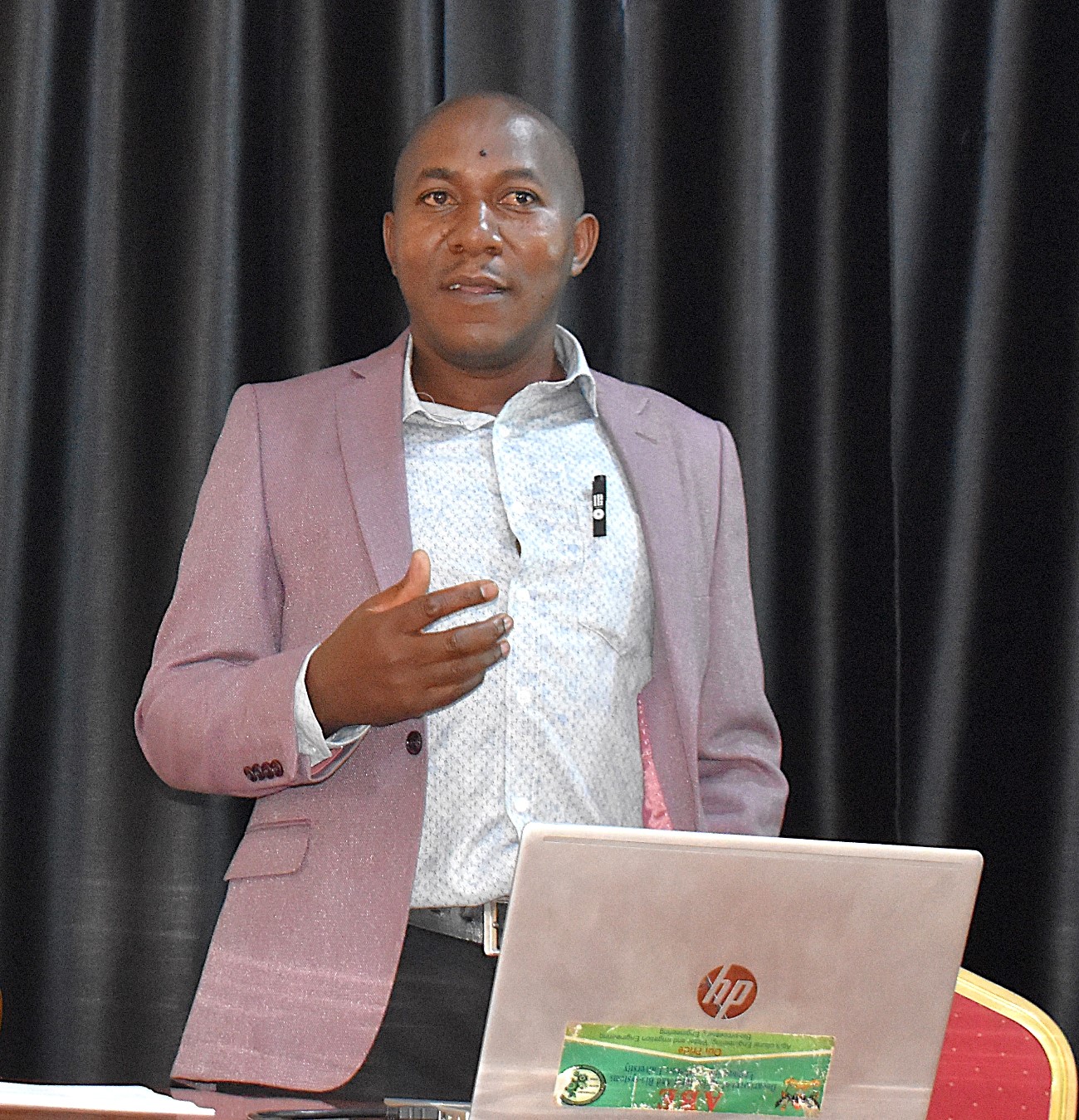
From June 23 to 27, 2025, Makerere University hosted a comprehensive Training of Trainers workshop. The training programme encompassed a diverse range of topics delivered by subject matter experts from institutions, including Makerere University (Department of Agricultural and Biosystems Engineering – CAES, and the College of Engineering, Design, Art and Technology – CEDAT), Hochschule University of Applied Sciences, and Busitema University. Participants were carefully selected from diverse professional backgrounds, including recent engineering graduates from CAES and CEDAT, Makerere University, University technical staff, personnel from Kyambogo University, officials from Buvuma District Works and Health Departments, and electricians from Kampala City. The training sessions were conducted at Makerere University and Buvuma Health Centre IV Hospital.
Training Modules Included:
- Sustainable energy systems and their practical applications
- Energy generation and storage technologies
- Solar water heating: design, operation, maintenance, and performance optimization of solar water heaters, crop dryers, and concentrating solar heaters
- Solar PV technologies in Uganda: cell technology, system design, operations, maintenance, and hands-on practicals for standalone and grid-connected systems
- Public health implications of water quality
- Water treatment and quality management, including protocols, parameters, and case study on the MCDI treatment system
- Water quality testing methodologies
- Introduction to sustainable refrigeration and cooling technologies
- Environmental impact and safety considerations for refrigerants
- Refrigeration cycles and component overview
- Life cycle assessment of SophiA technologies
- Thermal energy storage within the SophiA system
- Steam as a productive energy source
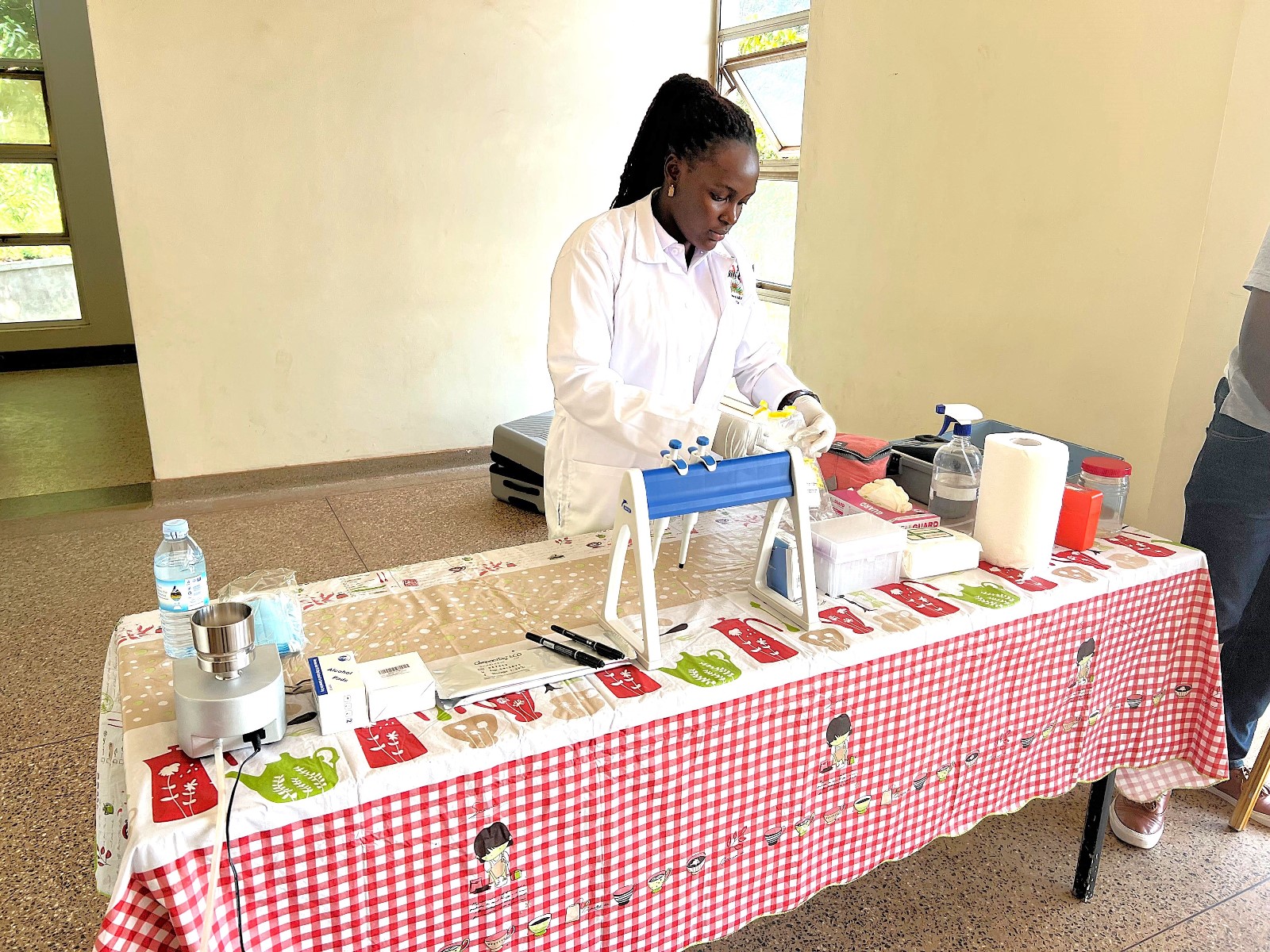
The Training Sessions
Day One: Introduction to foundational concepts in solar energy technologies
The first day of the SophiA Train the Trainers Workshop focused on building foundational knowledge in sustainable and solar energy systems. Led by Dr. Peter Tumutegyereize and Dr. Francis Mujjuni, participants explored a range of technologies and applications critical to clean energy deployment.
Key topics included:
Sustainable Energy Systems: Introduction to renewable energy systems including bioenergy, hydro, wind, geothermal, hydrogen fuel cells, and battery storage.
Solar Radiation & Geometry: Understanding solar constants, irradiance, and the impact of atmospheric conditions on solar performance.
Solar Thermal Technologies: Detailed look at solar water heating systems (FPCs and ETCs), maintenance, sizing, and solar dryers for agricultural and industrial use.
Photovoltaic (PV) Systems: Working principles, types of PV cells, performance factors, and diagnostics. Practical testing techniques and metrics like Voc, Isc, MPP, and PR were discussed.
Simulation & Application: Olivia Nakiwanuka demonstrated a PVsyst-based simulation of a 2.55 kWp standalone system for a conference hall, showing a high solar fraction (97.88%) and low LCOE (USD 0.03/kWh).
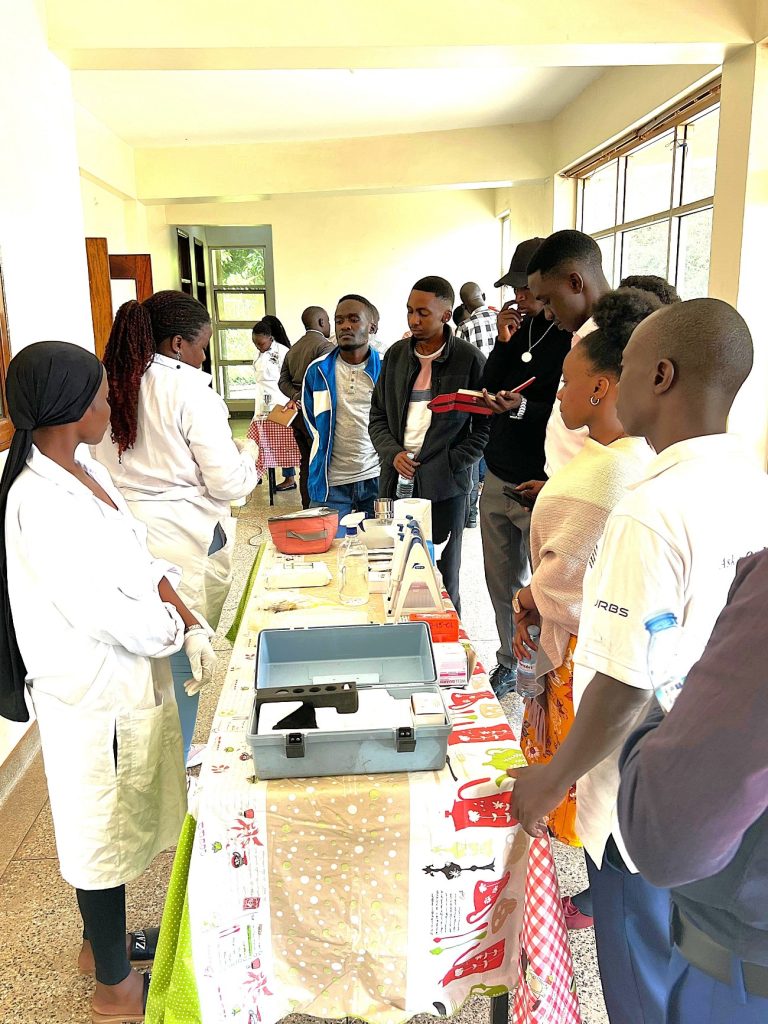
The sessions emphasized practical skills, performance analysis, and real-world application, equipping participants to train others and support solar adoption, especially in rural and off-grid settings.
Day Two: Water Treatment Technologies
The second day focused on water treatment technologies relevant to low-resource healthcare settings. Facilitated by Sneha De and Mr. Duc Dinh Ngoc from Hochschule Karlsruhe University, sessions covered technical, environmental, and operational challenges, with contributions from Dr. Joshua Wanyama on water quality management and Dr. Prossie Nakawuka on practical water testing.
Key challenges addressed included unreliable water supply and contamination in healthcare facilities, emphasizing the need for decentralized water treatment, especially in rural areas.
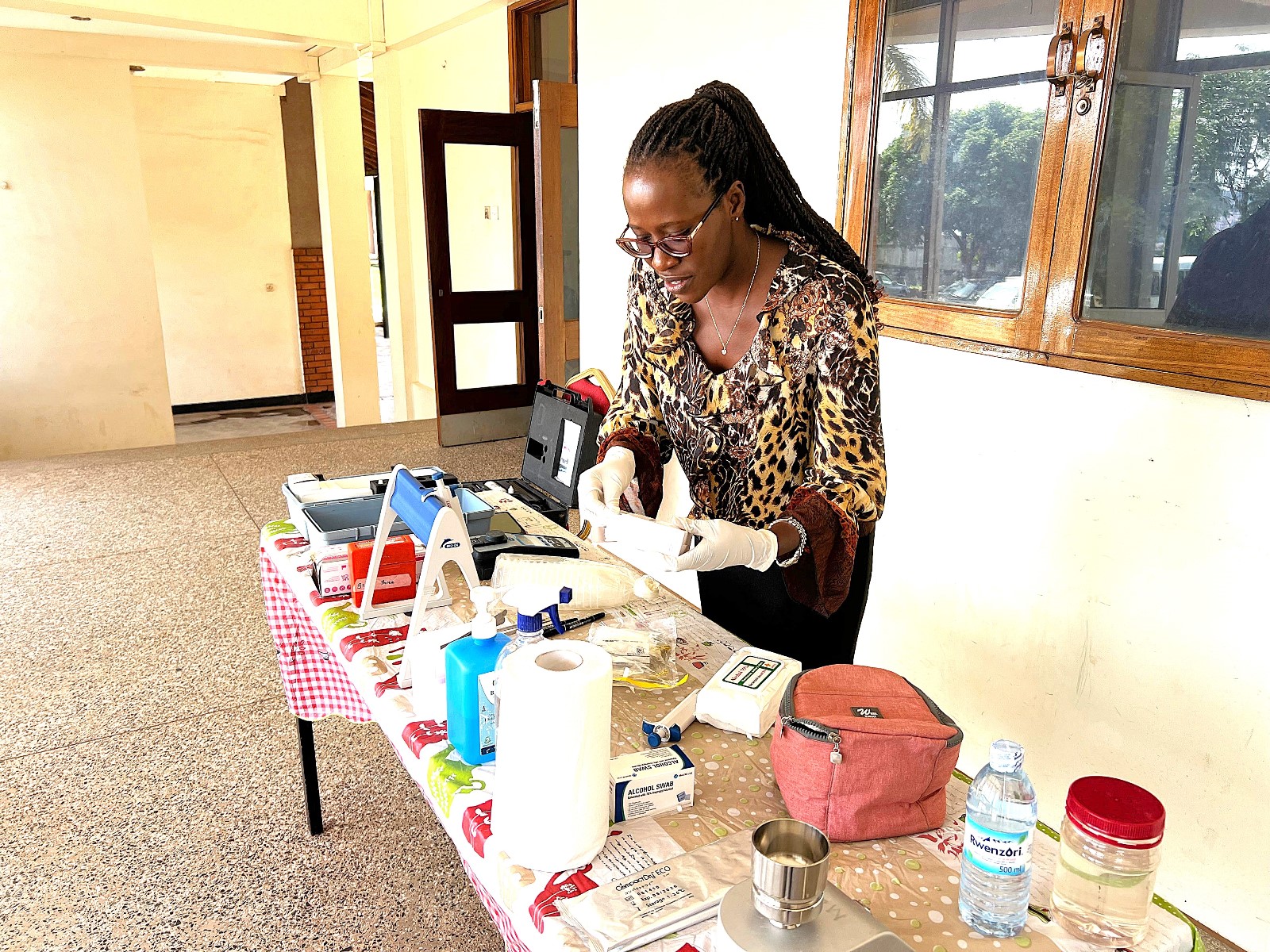
Sneha De reviewed biological and physical/chemical water treatment methods, highlighting technologies such as activated sludge, filtration, membrane bioreactors, and advanced disinfection techniques. The SophiA modular water treatment system, integrating ultrafiltration and membrane capacitive deionisation (MCDI), was introduced as a scalable solution for producing safe drinking and deionised water for medical use.
Mr. Duc Dinh Ngoc trained participants on the MCDI technology, an energy-efficient method for salt and fluoride removal suitable for low-salinity water.
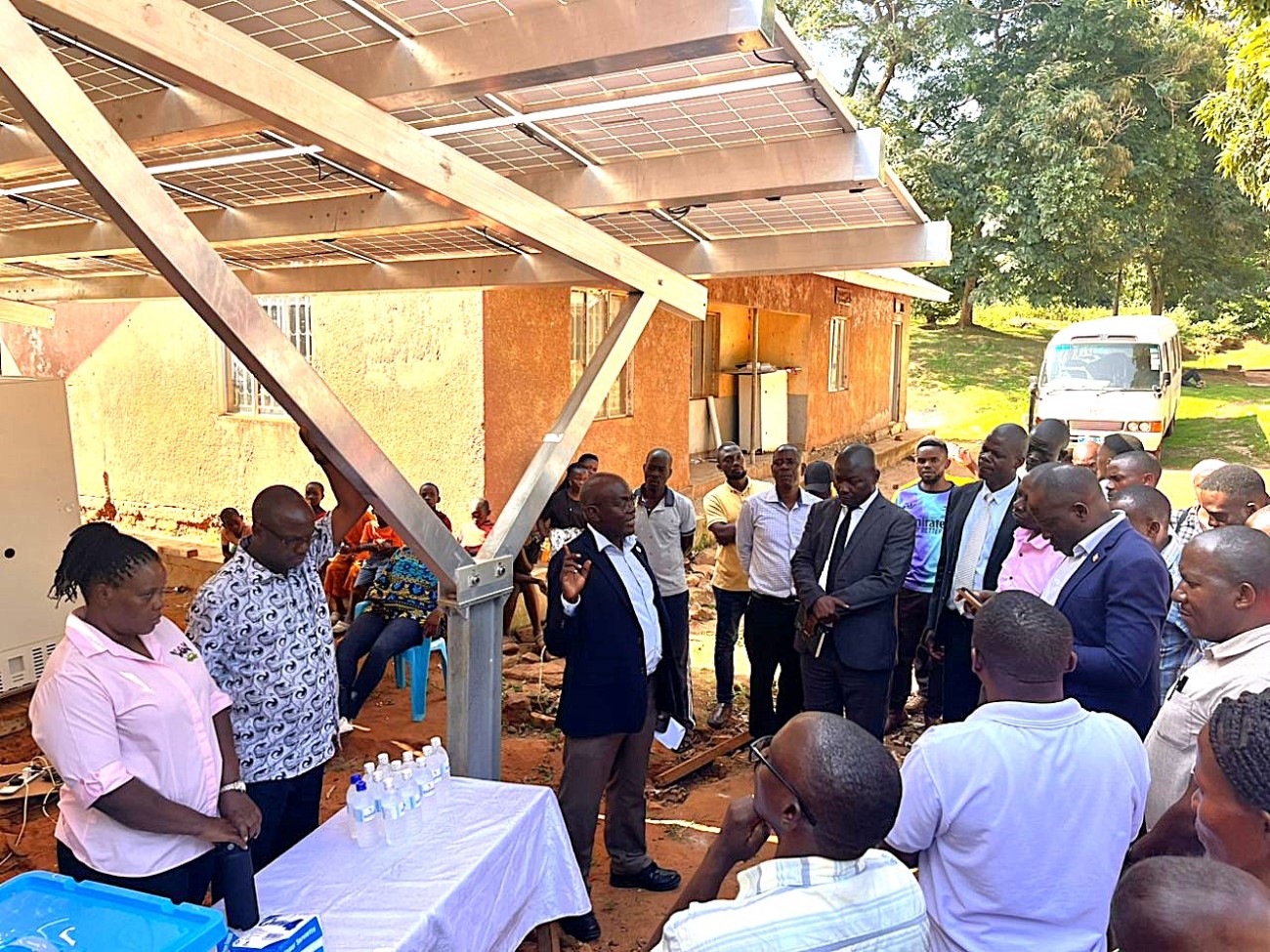
Dr. Joshua Wanyama discussed the water quality management protocols, outlining key physical, chemical, and biological water parameters and monitoring strategies, including modern IoT-based tools, to ensure water safety and public health.
The day concluded with a hands-on lab session by Dr. Prossie Nakawuka, where participants practiced water quality testing using turbidimeters, incubators, and filtration techniques.
Overall, Day Two combined theoretical insights, technology demonstrations, and practical skills, preparing participants to implement sustainable water treatment and quality management systems in healthcare environments.
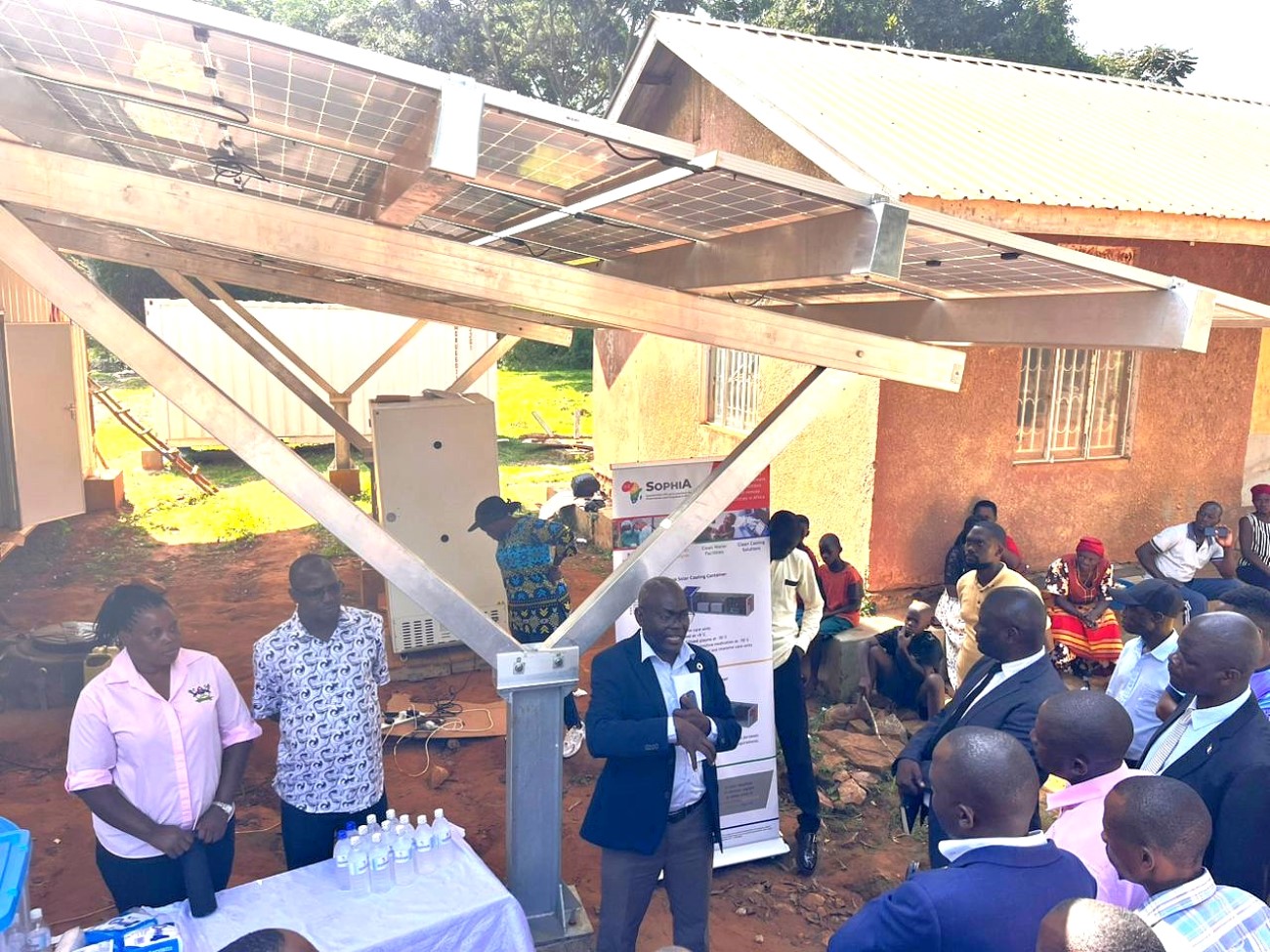
Day Three: Refrigeration and Cold Storage
The third day of the SophiA workshop focused on sustainable refrigeration and cold storage technologies tailored for healthcare in Sub-Saharan Africa. Experts discussed energy-efficient, climate-friendly cooling solutions vital for vaccine storage, medicines, and diagnostics, especially in off-grid and rural settings.
Key highlights included the introduction of solar-powered and biomass-based refrigeration systems, thermal energy storage methods, and the use of natural refrigerants like propane, ammonia, and CO₂ as environmentally safer alternatives. Presentations emphasized the critical role of refrigeration in healthcare and the urgent need to replace harmful chemicals with sustainable technologies.
Sessions covered real-world applications such as the SophiA cooling containers in Burkina Faso, safety protocols for flammable refrigerants, and the environmental and economic benefits of solar refrigeration systems assessed through life cycle analysis.
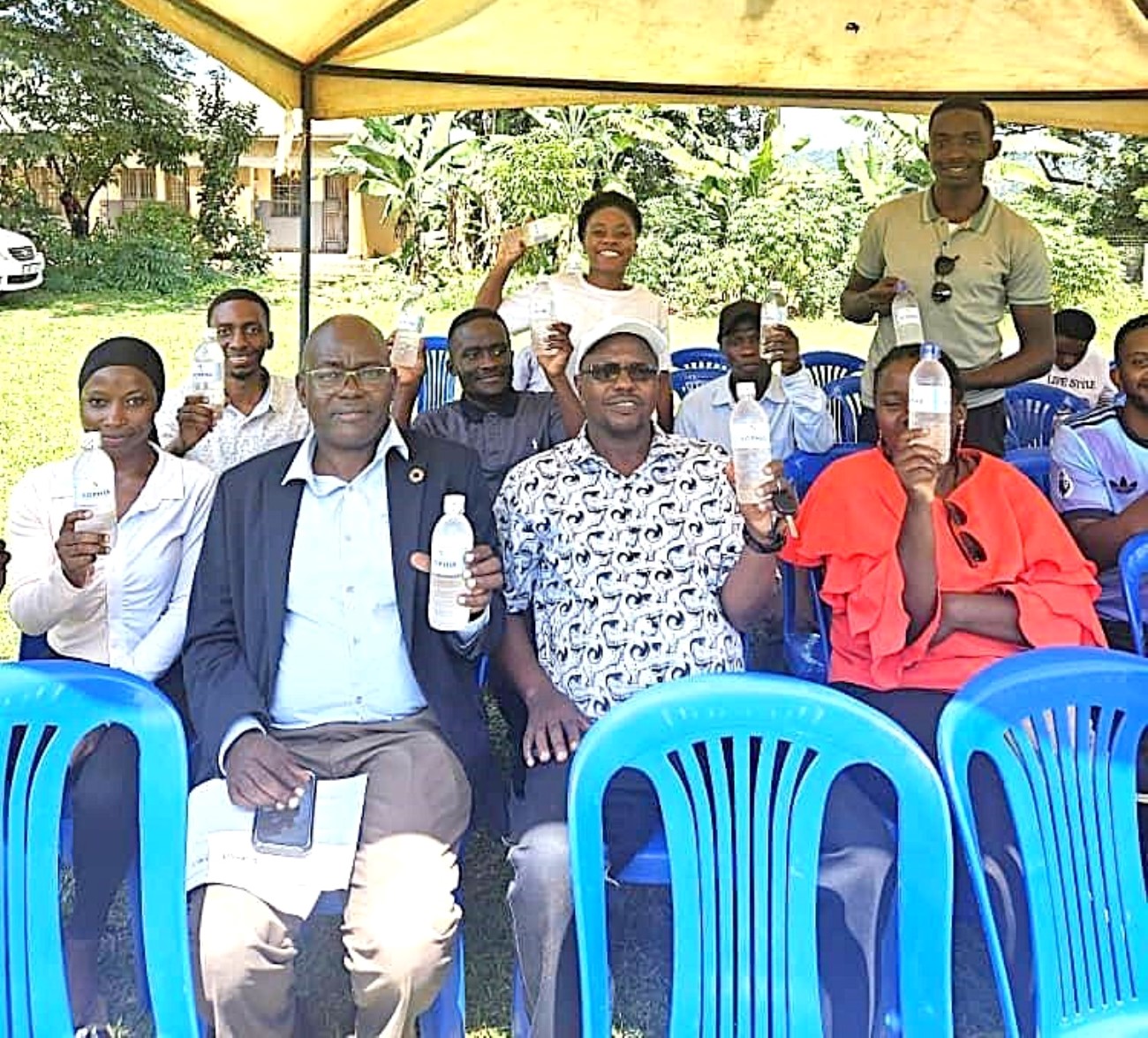
The day ended with an interactive quiz and discussion, reinforcing learning and encouraging participants to apply sustainable cooling practices in their communities.
Day Four: World Refrigeration Day & Field Visit to Buvuma Island
The fourth day of the SophiA Train the Trainers workshop was dedicated to the celebration of the World Refrigeration Day and a field excursion to Buvuma Island, providing participants with a unique opportunity to witness the SophiA system in action. The day was coordinated by Dr. Sarah Bimbona and Dr. Nicholas Kiggundu, who led the delegation to Buvuma Health Centre IV, the pilot site for the SophiA installation in Uganda.
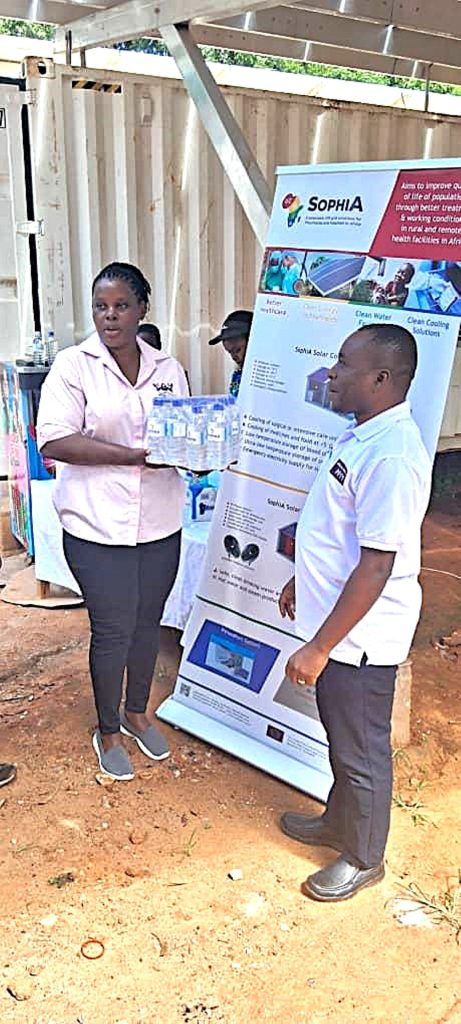
The visit served as both a practical extension of the previous day’s technical sessions and a community engagement event. Participants were able to observe the installed SophiA system, which integrates solar-powered refrigeration, water treatment and steam generation technologies designed for off-grid healthcare settings. During the visit, Dr. Kiggundu provided a detailed briefing to local stakeholders, including representatives from the Buvuma District Local Government, delegates from the Buganda Kingdom, and members of the local community. He explained how the SophiA system will enhance healthcare delivery on the island through reliable cold storage for vaccines and medicines, access to clean drinking water, and steam generated for cooking and use in the maternity wards.
As part of the long-term sustainability plan for the SophiA system, the launch of SophiA Water was announced, an entrepreneurial initiative designed to generate revenue locally for the operation and maintenance of the system.
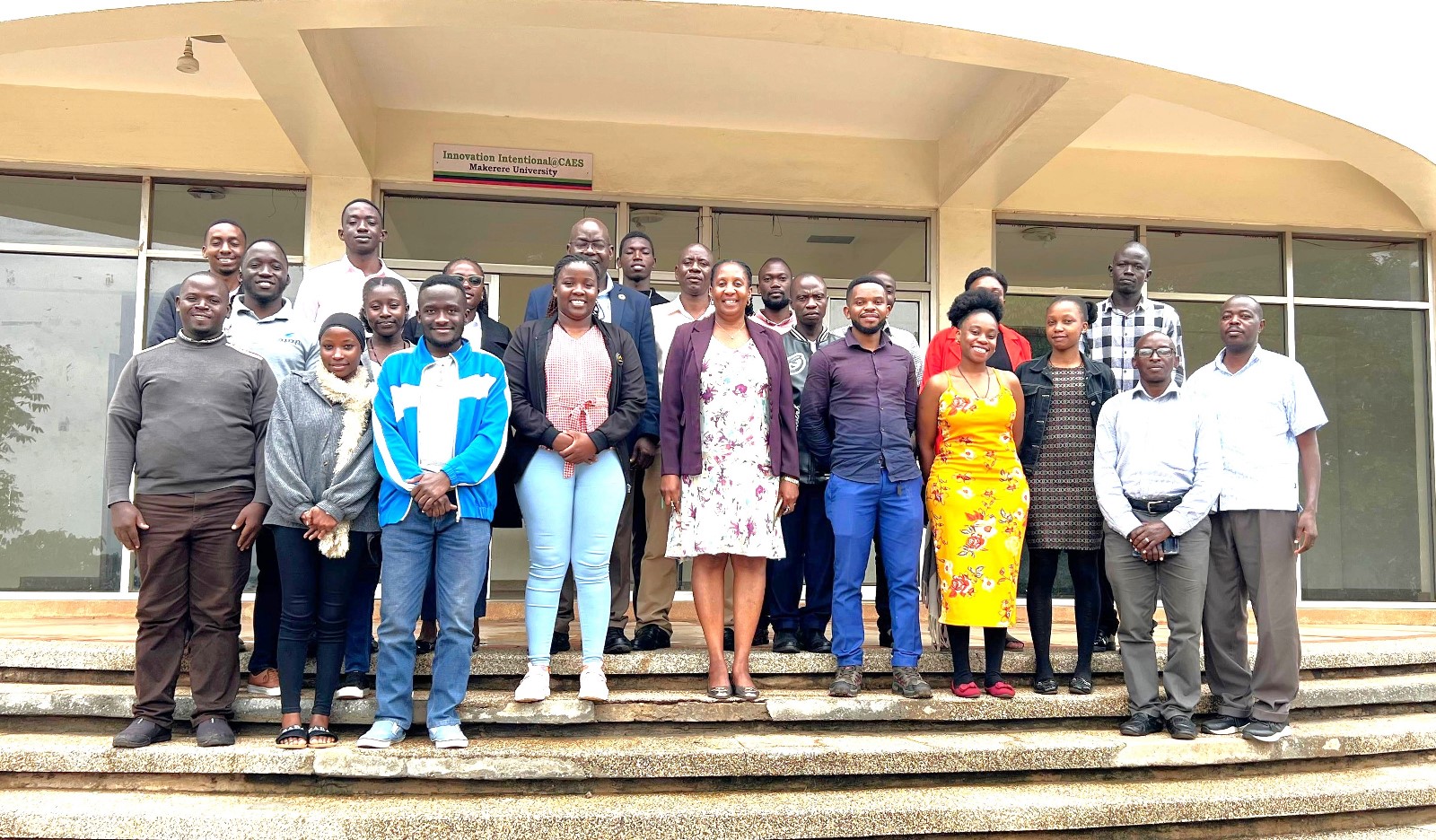
The field trip ended with a certificate awarding ceremony in appreciation of the participants’ dedication and active engagement throughout the training programme.
Agriculture & Environment
APRC Trains Graduate Students & Stakeholders in the Use of the African Agriculture Adaptation Atlas
Published
1 week agoon
July 3, 2025
The Agricultural Policy Research Centre (APRC), housed within the College of Agricultural and Environmental Sciences (CAES) at Makerere University, continues to play a pivotal role in shaping Uganda’s agricultural future through evidence-based policymaking. With a mission to ensure that agricultural policies are grounded in empirical research and data, APRC is actively investing in capacity-building initiatives that empower researchers, policymakers, and development actors.
In a significant stride toward building climate resilience in African agriculture, APRC recently organized a two-day intensive training workshop focused on the African Agriculture Adaptation Atlas (AAAA) – a state-of-the-art, web-based decision-support platform that facilitates the integration of climate data into agricultural planning and policy.

The workshop, held on Wednesday 25th and Thursday 26th June 2025 at the School of Agricultural Sciences, Makerere University, targeted two key groups: graduate students on the first day, and university faculty, government officials, and development practitioners on the second. This structure ensured tailored learning experiences for both emerging and seasoned professionals, helping to bridge the gap between academic research and real-world policy implementation.
The African Agriculture Adaptation Atlas (AAAA) is designed to provide dynamic, data-rich visualizations that support informed decision-making in agriculture and food systems across the continent. Through interactive maps and analytical tools, users can explore projected climate impacts, evaluate risks, and identify localized, climate-smart adaptation strategies.

Throughout the sessions, participants received hands-on training in a broad range of AAAA functionalities, including:
- Leveraging the Atlas for research and policy communication: Enhancing the ability of scientists and policy actors to translate complex climate data into actionable insights;
- Assessing projected climate impacts and associated agricultural risks: Essential for forward-looking planning and risk mitigation;
- Identifying climate-smart investment options, with a particular focus on the livestock sector, which is especially vulnerable to climate shocks;
- Analysing gendered vulnerabilities: Examining how climate change disproportionately affects women in agricultural communities;
- Understanding the implications of heat stress on agricultural productivity: Supporting targeted interventions to protect producers and their livelihoods;
- Estimating the economic returns of adaptation strategies: Aiding in prioritizing investments and allocating limited resources effectively.

Prof. Bernard Bashaasha, the APRC Coordinator, emphasized the importance of the training in advancing Africa’s adaptation agenda. “As climate change continues to threaten food security and disrupt livelihoods across the continent, tools like the AAAA, and the skills to use them effectively are essential. They empower decision-makers to craft policies that are adaptive, inclusive, and rooted in science,” he noted.
The workshop was coordinated by Dr. Florence Rwiza, Lecturer in the Department of Agribusiness and Natural Resource Economics at CAES.
More photos from the Training






Agriculture & Environment
NbS4Tea Project Team Makes Great Progress, Deploys Drones for Data Collection
Published
2 weeks agoon
June 24, 2025
****Funded by the Danish Fellowship Centre under Denmark’s Ministry of Foreign Affairs, NbS4Tea is a five-year initiative aimed at enhancing climate resilience and tea productivity in Uganda.
Launch of drones for data collection
The Nature-based Solutions for Tea (NbS4Tea) project has registered a significant milestone with the successful deployment of drones to improve environmental and agricultural data collection.
On 19th June 2025, the project team officially launched the drones at the Rwebitaba Tea Research Centre in Kyenjojo District, the project’s main research hub. The launch event included hands-on training sessions by Mr. Timothy Mutungi, a certified Remote Sensing Drone Pilot. Mr. Mutungi provided detailed instruction on drone operation, safety procedures, and data acquisition techniques specifically tailored to the project’s goals. The training was attended the core NbS4Tea researchers as well as students supported by the project.

By utilizing drone technology, the team will be able to capture high-resolution imagery and gather critical environmental data across vast tea-growing areas. This will enable more precise assessments of biodiversity, soil health, water use, and overall ecosystem services. The valuable insights generated will guide the development of sustainable, nature-based agricultural practices with the potential for widespread adoption throughout the tea industry.
About the NbS4Tea Project
NbS4Tea is a five-year initiative aimed at enhancing climate resilience and tea productivity in Uganda. Funded by the Danish Fellowship Centre under Denmark’s Ministry of Foreign Affairs and led by Dr Emmanuel Arthur from Aarhus University, the project is being implemented through a consortium of Ugandan and Danish institutions namely: Makerere University, the National Agricultural Research Organization (NARO), Uganda, Uganda Tea Association, Aarhus University, Denmark, and Kick-start International.

The primary objective of the project is to sustainably close the tea yield gap in Uganda by developing research-driven, nature-based solutions that enhance the climate resilience of tea production systems. This involves identifying climate-resilient tea varieties, integrating tea prunings and banana by-products, utilizing nitrogen-fixing agroforestry trees, and improving irrigation management. The approach emphasizes socio-economic feasibility, capacity building in research, and a market-oriented, multi-stakeholder collaboration to ensure both environmental and economic sustainability.
At Makerere University, the project is coordinated by Dr Alex Nimusiima from the Department of Geography, Geo-Informatics and Climatic Sciences at CAES. Other Project members are; Dr Grace Nakabonge from the Department of Forestry, Biodiversity and Tourism; Dr Prossy Nakawuka from the Department of Agricultural and Bio-systems Engineering; Dr Twaha Ali Basamba from the Department of Agricultural Production; and Dr Alice Turinawe from the Department of Agribusiness and Natural Resource Economics.

Specific objectives
- Identify and quantify climate change impacts on tea yield and quality based on historical and newly obtained data and novel data mining methods.
- Screen, select and recommend tea varieties adapted to abiotic (drought and heat) and biotic stresses (diseases and pests).
- Develop new knowledge on the potential of local waste biomass (tea prunings, banana pseudostems and peels) as soil amendments- mulch, compost, biochar, to recycle nutrients, improve soil fertility, increase carbon sequestration and alleviate drought.
- Reveal NbS through agroforestry combined with organic mulch, irrigation and resilient tea varieties that increase biodiversity and tea yield.
- Innovate new methods to enhance tea production under climate change through rainwater harvest and climate-smart irrigation infrastructure.
- Empower vulnerable groups (women, youth, and people with disabilities) in tea production and processing to ensure multi-actor involvement and socio-economic benefit outreach of the proposed NbS in tea cultivation and production.
- Identify export market strategies for NbS tea products, aligned with consumer preferences.

Progress thus far
Launched in January 2024, the project, organized in five work packages, has registered significant progress. Each of the work packages listed below supports one PhD student and one Masters’ student. The PhD students are: i) Mr. Adiga Hassan from the Department of Geography, Geo-Informatics and Climatic Sciences at CAES conducting research under work package 1; ii) Ms. Sarah Namayengo from the Department of Forestry, Biodiversity and Tourism conducting research under work package 2; Ms. Vivian Namutebi from the Department of Soil Science and Land Use Management undertaking research on work package 3; Mr. Keneth Chelimo from the Department of Agricultural and Biosystems Engineering conducting his research under work package 4; and Ms. Moreen Asasira from the Department of Agribusiness and Natural Resource Economics focusing on work package 5. The Masters students are: i) Ms. Evelyn Katasi from the Department of Environmental Management at CAES (work package 1), Mr. Vereriano Turyahebwa from Department of Forestry, Biodiversity and Tourism (work package 2); Mr. Ben Okurut from the Department of Soil Science and Land Use Management (work package 3); Mr. Augustine Okot from the Department of Agricultural and Biosystems Engineering (work package 4); and Mr. Augustine Kigozi from the Department of Agribusiness and Natural Resource Economics (work package 5)

Work packages and achievements registered
Work Package 1: Climate change impacts on tea yield and quality – Headed by Dr. Alex Nimusiima
This work package centres on the analysis of historical and projected climate conditions in the study area. It examines how current climate patterns influence tea production, as well as the potential effects of future climate change on tea yield and quality.
Progress
i) A household survey assessing the socio-economic status of tea farmers and the effects of climate variability on their livelihoods has been completed.
ii) The collected data has been cleaned, and the Masters student supported under this work package is currently writing her thesis based on the survey findings.
iii) A historical climate analysis of the study area has been conducted by the PhD student, who is now preparing a manuscript.

Work Package 2: Screening & selecting tea genotypes for resilience to abiotic and biotic stresses – Headed by Assoc. Prof. Grace Nakabonge
This work package focuses on evaluating existing tea genotypes for their resistance to pests and diseases, using chlorophyll fluorescence imaging as a diagnostic tool.
Progress
i) A screen house has been constructed to serve as the experimental site.
ii) Germplasm from two tea varieties is currently being cultivated in the screen house in preparation for the upcoming experiments.
iii) A drone has been acquired to assist in data collection for this work package.

Work Package 3: Evaluation of NbS for climate resilience, higher yield and biodiversity- Headed by Assoc. Prof. Twaha Ali Basamba
This focuses on the characterization of mulch and biochar derived from tea prunings to improve soil health. It also aims to quantify the added value of Nature-based Solutions (NbS) in enhancing tea productivity, promoting climate resilience, and supporting biodiversity.
Progress
- So far, Biochar has been produced from tea prunings and characterized.
- The Masters student supported under this work package is writing his thesis on the results of biochar characterization.

Work Package 4: Innovating smart and scalable irrigation technology for improved tea production- Headed by Dr. Prossie Nakawuka
This work package aims to develop and evaluate smart, scalable irrigation solutions to boost tea production. It focuses on assessing how irrigation impacts tea yield and quality, measuring water use efficiency, and analyzing the economic returns of irrigation practices. Additionally, it explores deficit irrigation and climate-resilient strategies to ensure sustainable tea farming in changing environmental conditions.
Progress
- The irrigation infrastructure is now in place and fully operational at Rwebitaba Tea Research Centre in Kyenjojo District.
- The experimental plots for irrigation experiments are already in place with water pipes.

Work package 5: Socio-economic assessment of tea-agroforestry and selected tea varieties – Headed by Dr. Alice Turinawe
This work package emphasizes co-creation within multi-stakeholder innovation networks to evaluate the economic feasibility and market access of tea agroforestry systems. It also focuses on promoting gender balance and understanding consumer valuation of Nature-based Solutions (NbS) tea from Uganda.
Progress
To date, two co-creation workshops have been successfully conducted and the Masters student under this work package is currently analyzing the workshop results as part of their research.

Expected outputs and outcomes
- Increased tea production, productivity, and biodiversity through the adoption of NbS.
- Increased research and technical capacity of Makerere and R-ZARDI.
- Holistic stakeholder insight on economic feasibility, consumer acceptance and market access strategies, especially for vulnerable groups in the tea value chain.
- Increased job prospects for youth and women in tea production sub-sectors.
- Improved social status and increased incomes of tea farmers, traders, and exporters.
- Improved economic and environmental quality by recycling biomass waste into value-added products dedicated to soil enhancement.
- 4+ high-yielding tea genotypes adapted to drought and heat, diseases and pests.
- 15+ scientific articles, conference presentations.
- Five PhDs and Five MSc degrees.
- Market access assessment and empowerment.

Details on the project: https://news.mak.ac.ug/2024/01/new-caes-project-to-improve-tea-production-in-uganda/
More photos from the event



Trending
-

 Education7 days ago
Education7 days agoAdmission List to Bachelor of Education External (BED) 2025/26 -Private Sponsorship
-

 General1 week ago
General1 week agoUndergraduate Admission List Self Sponsorship Scheme 2025/2026
-

 General2 weeks ago
General2 weeks agoMature Age Scheme Exam Results for 2025/2026
-

 General3 days ago
General3 days agoRe-advert: Admission to Undergraduate Programmes 2025/2026
-
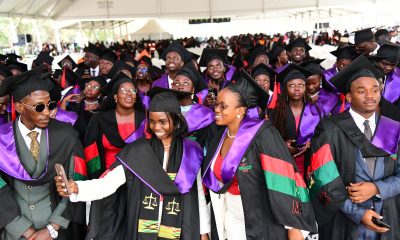
 General1 week ago
General1 week agoAdmission Lists for – Bachelor of Laws 2025-26
